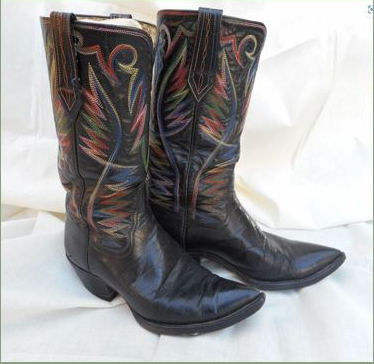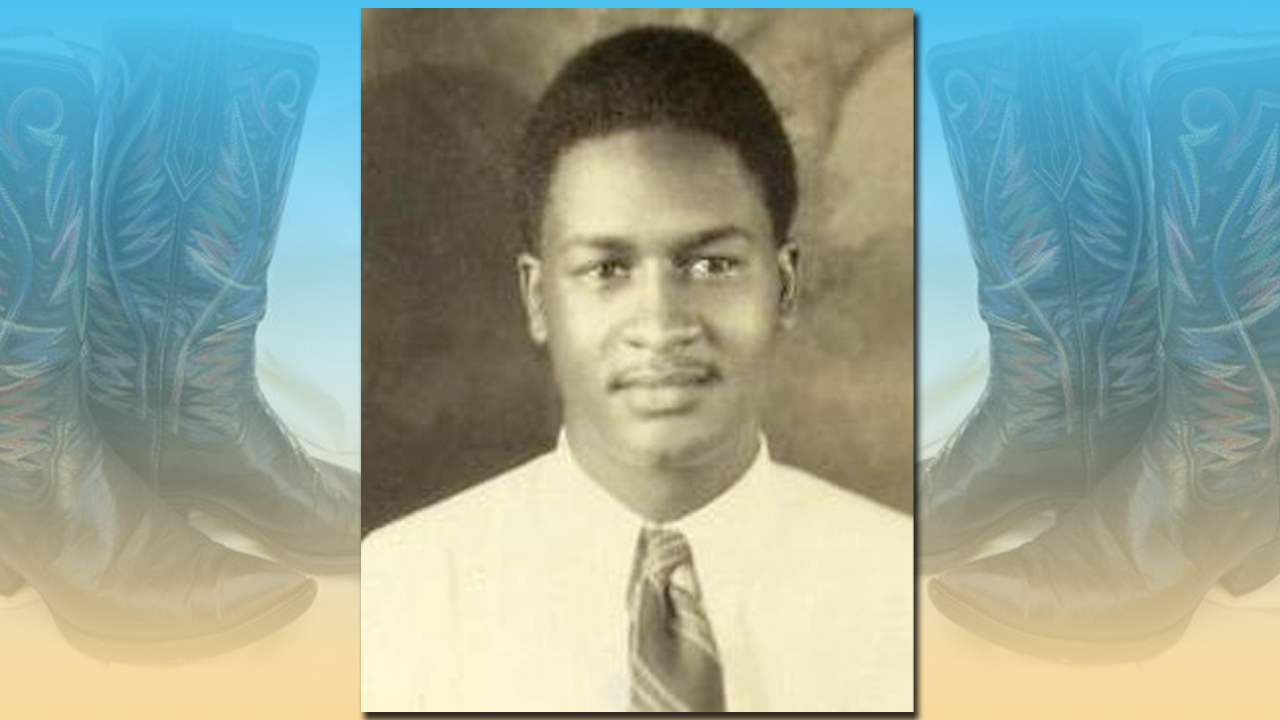Image of Willie Lusk Jr., courtesy of city website (boots in the background from Lubbock County Historical Commission Facebook page)
Willie Lusk is a name you likely don’t know but should.
At a time when blacks were segregated by Jim Crow laws in Lubbock, Lusk, an African American, rose to national and international fame as the “Texas King of Cowboy Boots.”
With his boots, he touched the soles (and possibly the souls too) of Ronald Reagan, Omar Bradley, Betty White, Shirley Temple, Merle Haggard, Roy Rogers, Gene Autry, Audie Murphy and more according to an assortment of historical sources including his own advertising fliers.
Lusk not only rose to foreman in a white man’s boot shop in downtown Lubbock, he also started his own business and outlasted every one of his local white counterparts.
The Texas Historical Commission approved a marker in Lubbock which the city and the Lubbock County Historical Commission will dedicate Thursday morning in Lusk Park.
How it started
Born in 1914, Lusk apprenticed with a boot maker at about age 13 in San Angelo. He moved to Lubbock in 1934 for a job at Brown’s Boot and Saddle Shop on Broadway and Avenue K.
He rose from a shoe shiner to foreman, overseeing 22 other bootmakers – all of them white.
“There was … very little friction or difficulty between Lusk and the white bootmakers under him,” according to a master’s thesis written by a Texas Tech student.
The thesis went to great lengths to describe how unusual that was for Lubbock, presenting multiple examples of local racism from that time.
Among the notable customers of Brown’s Boot was Benny Binion. The master’s thesis said Binion was notable for all the wrong reasons and had been pushed out of Dallas.
In 1946, Binion – a gambler who was in the process of developing a casino in Las Vegas during the same era as gangster Bugsy Seigel – asked Lusk why he didn’t have his own shop. When Lusk said it would take $2,500, Binion handed him cash right on the spot.
Lusk’s Boot Shop was born.
‘The only one’
Cameron Saffell, Ph.D., assistant director at the Museum of Texas Tech University, described just how rare someone like Lusk was.
“It was at the time the fifth shoe and boot shop in Lubbock, and by 1969 it was the only one still in business,” Saffell said. “The popularity of mass manufactured boots started to cause a lot of the small boot makers to go out of … business.”
“Lusk stuck with it because he believed in the quality and he believed that he had a good product and he was a good promoter,” Saffell said.
Much of Lusk’s promotion was word of mouth. The first few days of his new shop at 1706 Avenue A – a building that has since been torn down – his customers were a few African Americans. Within months, word got out, and he was flooded with so many customers that the shop had a six-month backlog.
Lusk made regular trips to Binion’s Horseshoe Casino in Las Vegas.
“He’d come back with an arm full of orders,” Saffell said. “He was only one of two boot makers in Texas that was African American that owned their own shop.”
The title “Texas King of Cowboy Boots” came from the July 1951 issue of Coronet, a monthly Magazine. He’d been featured in Ebony Magazine in 1948.
The museum hosted a temporary exhibit on Lusk and still maintains an online exhibit.
The 10-point stitch
Lusk and his employees did not sign his boots. But he left his mark on them in the form of a 10-point stitch.

“The ‘10’ comes from the number of flames,” Saffell said.
The text of Lusk’s Texas historic marker said his boots could be identified by a “distinctive flame stitch” and the use of wooden pegs instead of nails in the soles.
His boots were made from cowhide leather. But customers could also request leather from a kangaroo, alligator, sharkskin or pigskin.
Lusk died of cancer in 1976. His wife sold the business to Charles Wade in 1977 who moved the shop to 3019 34th Street. It remained there until it closed in 1991.
The city named a park after Lusk in 1990.
“The kids that come to play there see the name on the park. But now, they can read a little bit about the history of the guy who it’s named for,” Saffell said.
An online post from the National Ranching Heritage Center in Lubbock said, “Though Lusk’s Boot Shop closed after Lusk’s death in 1976, his boots remain a treasured collector’s item.”
Comment, react or share on our Facebook post.


 Facebook
Facebook